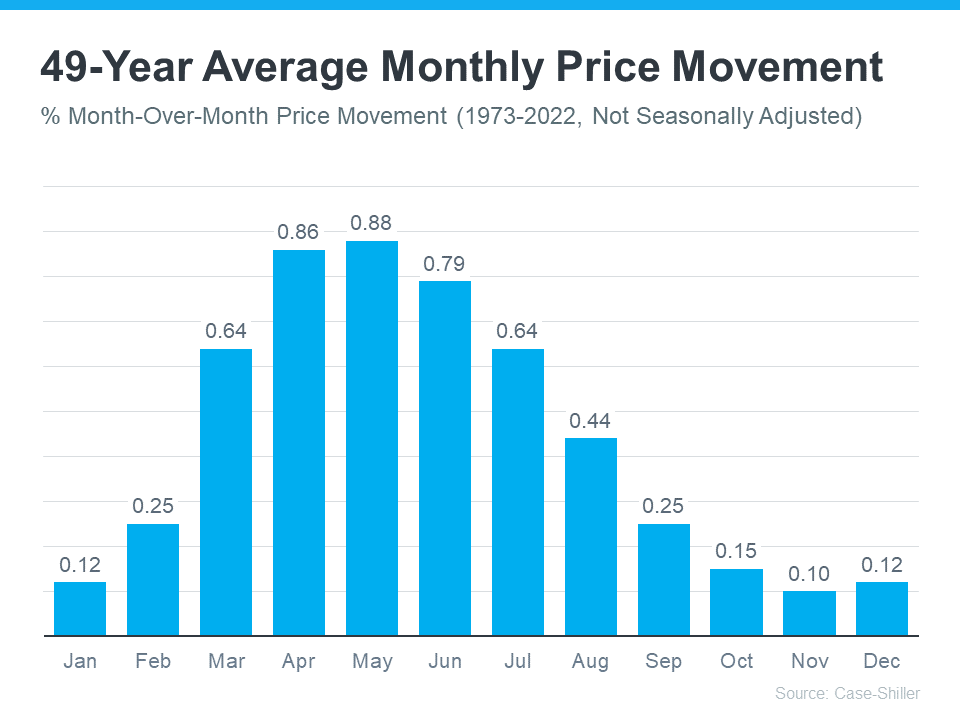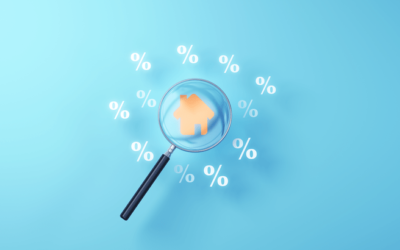
“Despite what you may be hearing in the news, nationally, home prices aren’t falling.”
If you’re thinking of making a move, one of the biggest questions you have right now is probably: what’s happening with home prices? Despite what you may be hearing in the news, nationally, home prices aren’t falling. It’s just that price growth is beginning to normalize. Here’s the context you need to really understand that trend.
In the housing market, there are predictable ebbs and flows that happen each year. It’s called seasonality. Spring is the peak homebuying season when the market is most active. That activity is typically still strong in the summer but begins to wane as the cooler months approach. Home prices follow along with seasonality because prices appreciate most when something is in high demand.
That’s why there’s a reliable long-term home price trend. The graph below uses data from Case-Shiller to show typical monthly home price movement from 1973 through 2022 (not adjusted, so you can see the seasonality):
As the data shows, at the beginning of the year, home prices grow, but not as much as they do in the spring and summer markets. That’s because the market is less active in January and February since fewer people move in the cooler months. As the market transitions into the peak homebuying season in the spring, activity ramps up, and home prices go up a lot more in response. Then, as fall and winter approach, activity eases again. Price growth slows, but still typically appreciates.
After several unusual ‘unicorn’ years, today’s higher mortgage rates helped usher in the first signs of the return of seasonality. As Selma Hepp, Chief Economist at CoreLogic, explains:
“High mortgage rates have slowed additional price surges, with monthly increases returning to regular seasonal averages. In other words, home prices are still growing but are in line with historic seasonal expectations.”
Why This Is So Important to Understand
In the coming months, you’re going to see the media talk more about home prices. In their coverage, you’ll likely see industry terms like these:
- Appreciation: when prices increase.
- Deceleration of appreciation: when prices continue to appreciate, but at a slower or more moderate pace.
- Depreciation: when prices decrease.
Don’t let the terminology confuse you or let any misleading headlines cause any unnecessary fear. The rapid pace of home price growth the market saw in recent years was unsustainable. It had to slow down at some point and that’s what we’re starting to see – deceleration of appreciation, not depreciation.
Remember, it’s normal to see home price growth slow down as the year goes on. And that definitely doesn’t mean home prices are falling. They’re just rising at a more moderate pace.
Bottom Line
While the headlines are generating fear and confusion on what’s happening with home prices, the truth is simple. Home price appreciation is returning to normal seasonality. If you have questions about what’s happening with prices in our local area, let’s connect.
To view original article, visit Keeping Current Matters.
Should You Sell Your House As-Is or Make Repairs?
So, how do you make sure you’re making the right decision for your move? The key is working with a pro.
How Co-Buying a Home Helps with Affordability Today
If you are an aspiring homeowner, buying a home with your family or friends could be an option.
Why Today’s Mortgage Debt Isn’t a Sign of a Housing Market Crash
Most homeowners today are employed and have low-interest mortgages they can afford, so they are able to make payments.
What’s Behind Today’s Mortgage Rate Volatility?
The best way to navigate this landscape is to have a team of real estate experts by your side.
Don’t Let These Two Concerns Hold You Back from Selling Your House
Working with a local real estate agent is the best way to see what inventory trends look like in your area.
More Homes, Slower Price Growth – What It Means for You as a Buyer
Having a real estate agent who knows the local area can be a big advantage when you start the buying process.








.jpg )



